| Listing 1 - 10 of 13 | << page >> |
Sort by
|
Book
Year: 2008 Publisher: Universitätsverlag Göttingen
Abstract | Keywords | Export | Availability | Bookmark
 Loading...
Loading...Choose an application
- Reference Manager
- EndNote
- RefWorks (Direct export to RefWorks)
Metadata is a key aspect of our evolving infrastructure for information management, social computing, and scientific collaboration. DC-2008 will focus on metadata challenges, solutions, and innovation in initiatives and activities underlying semantic and social applications. Metadata is part of the fabric of social computing, which includes the use of wikis, blogs, and tagging for collaboration and participation. Metadata also underlies the development of semantic applications, and the Semantic Web — the representation and integration of multimedia knowledge structures on the basis of semantic models. These two trends flow together in applications such as Wikipedia, where authors collectively create structured information that can be extracted and used to enhance access to and use of information sources. Recent discussion has focused on how existing bibliographic standards can be expressed as Semantic Web vocabularies to facilitate the integration of library and cultural heritage data with other types of data. Harnessing the efforts of content providers and end-users to link, tag, edit, and describe their information in interoperable ways (”participatory metadata”) is a key step towards providing knowledge environments that are scalable, self-correcting, and evolvable. DC-2008 will explore conceptual and practical issues in the development and deployment of semantic and social applications to meet the needs of specific communities of practice.
Social Sciences --- Library & Information Science --- metadata --- social applications --- semantic applications --- Dublin Core --- Folksonomy --- Library of Congress Subject Headings --- Resource Description Framework --- Simple Knowledge Organization System --- Uniform Resource Identifier
Book
Year: 2008 Publisher: Universitätsverlag Göttingen
Abstract | Keywords | Export | Availability | Bookmark
 Loading...
Loading...Choose an application
- Reference Manager
- EndNote
- RefWorks (Direct export to RefWorks)
Metadata is a key aspect of our evolving infrastructure for information management, social computing, and scientific collaboration. DC-2008 will focus on metadata challenges, solutions, and innovation in initiatives and activities underlying semantic and social applications. Metadata is part of the fabric of social computing, which includes the use of wikis, blogs, and tagging for collaboration and participation. Metadata also underlies the development of semantic applications, and the Semantic Web — the representation and integration of multimedia knowledge structures on the basis of semantic models. These two trends flow together in applications such as Wikipedia, where authors collectively create structured information that can be extracted and used to enhance access to and use of information sources. Recent discussion has focused on how existing bibliographic standards can be expressed as Semantic Web vocabularies to facilitate the integration of library and cultural heritage data with other types of data. Harnessing the efforts of content providers and end-users to link, tag, edit, and describe their information in interoperable ways (”participatory metadata”) is a key step towards providing knowledge environments that are scalable, self-correcting, and evolvable. DC-2008 will explore conceptual and practical issues in the development and deployment of semantic and social applications to meet the needs of specific communities of practice.
Book
ISBN: 0844409065 Year: 1996 Publisher: Washington (D.C.) Library of Congress. Cataloging Distribution Service
Abstract | Keywords | Export | Availability | Bookmark
 Loading...
Loading...Choose an application
- Reference Manager
- EndNote
- RefWorks (Direct export to RefWorks)
Subject indexing
---
025.43
---
#BIBC:ruil
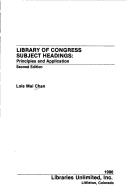
Abstract | Keywords | Export | Availability | Bookmark
 Loading...
Loading...Choose an application
- Reference Manager
- EndNote
- RefWorks (Direct export to RefWorks)
Catalogage par matieres --- Catalogisering [Onderwerps] --- Catalogisering [Trefwoord] --- Onderwerpscatalogisering --- Onderwerpsontsluiting --- Subject cataloging --- Trefwoordcatalogisering --- 025.43 --- Subject headings, Library of Congress --- LC subject headings --- LCSH (Library of Congress subject headings) --- Library of Congress subject headings --- Subject headings --- Trefwoordensystemen. Thesauri. Descriptorlijsten --- 025.43 Trefwoordensystemen. Thesauri. Descriptorlijsten
Multi
ISBN: 9781856046183 1856046184 9781783300365 1783300361 Year: 2012 Publisher: London Facet Publishing
Abstract | Keywords | Export | Availability | Bookmark
 Loading...
Loading...Choose an application
- Reference Manager
- EndNote
- RefWorks (Direct export to RefWorks)
Library of Congress Subject Headings (LCSH) are increasingly seen as 'the' English language controlled vocabulary, despite their lack of a theoretical foundation, and their evident US bias. In mapping exercises between national subject heading lists, and in exercises in digital resource organization and management, LCSH are often chosen because of the lack of any other widely accepted English language standard for subject cataloguing. It is therefore important that the basic nature of LCSH, their advantages, and their limitations, are well understood both by LIS practitioners and those in the wider information community. Information professionals who attended library school before 1995 - and many more recent library school graduates - are unlikely to have had a formal introduction to LCSH. Paraprofessionals who undertake cataloguing are similarly unlikely to have enjoyed an induction to the broad principles of LCSH. This is the first compact guide to LCSH written from a UK viewpoint.
Subject cataloging. --- Subject headings, Library of Congress. --- 025.4 --- LC subject headings --- LCSH (Library of Congress subject headings) --- Library of Congress subject headings --- Subject headings --- Subject analysis --- Cataloging --- Content analysis (Communication) --- Indexing --- 025.4 Ontsluitings- en terugzoektalen. Classificaties. Thesauri. Metadata voor information retrieval --- Ontsluitings- en terugzoektalen. Classificaties. Thesauri. Metadata voor information retrieval --- Subject indexing --- Subject cataloging --- Subject headings, Library of Congress --- Library of Congress.
Book
Year: 2008 Publisher: Universitätsverlag Göttingen
Abstract | Keywords | Export | Availability | Bookmark
 Loading...
Loading...Choose an application
- Reference Manager
- EndNote
- RefWorks (Direct export to RefWorks)
Metadata is a key aspect of our evolving infrastructure for information management, social computing, and scientific collaboration. DC-2008 will focus on metadata challenges, solutions, and innovation in initiatives and activities underlying semantic and social applications. Metadata is part of the fabric of social computing, which includes the use of wikis, blogs, and tagging for collaboration and participation. Metadata also underlies the development of semantic applications, and the Semantic Web — the representation and integration of multimedia knowledge structures on the basis of semantic models. These two trends flow together in applications such as Wikipedia, where authors collectively create structured information that can be extracted and used to enhance access to and use of information sources. Recent discussion has focused on how existing bibliographic standards can be expressed as Semantic Web vocabularies to facilitate the integration of library and cultural heritage data with other types of data. Harnessing the efforts of content providers and end-users to link, tag, edit, and describe their information in interoperable ways (”participatory metadata”) is a key step towards providing knowledge environments that are scalable, self-correcting, and evolvable. DC-2008 will explore conceptual and practical issues in the development and deployment of semantic and social applications to meet the needs of specific communities of practice.
Social Sciences --- Library & Information Science --- metadata --- social applications --- semantic applications --- Dublin Core --- Folksonomy --- Library of Congress Subject Headings --- Resource Description Framework --- Simple Knowledge Organization System --- Uniform Resource Identifier --- metadata --- social applications --- semantic applications --- Dublin Core --- Folksonomy --- Library of Congress Subject Headings --- Resource Description Framework --- Simple Knowledge Organization System --- Uniform Resource Identifier
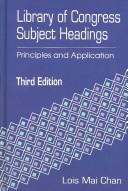
ISBN: 1563081954 1563081911 9781563081958 Year: 1995 Publisher: Littleton Libraries unlimited
Abstract | Keywords | Export | Availability | Bookmark
 Loading...
Loading...Choose an application
- Reference Manager
- EndNote
- RefWorks (Direct export to RefWorks)
Subject headings [Library of Congress ] --- Trefwoorden [Library of Congress ] --- Vedettes-matiere de la Library of Congress --- Subject headings, Library of Congress --- Vedettes-matière de la Library of Congress --- 025.43 LCSH --- LC subject headings --- LCSH (Library of Congress subject headings) --- Library of Congress subject headings --- Subject headings --- Trefwoordensystemen. Thesauri. Descriptorlijsten--LCSH --- Subject headings, Library of Congress. --- 025.43 LCSH Trefwoordensystemen. Thesauri. Descriptorlijsten--LCSH --- Vedettes-matière de la Library of Congress --- Vedettes-matiere de la library of congress
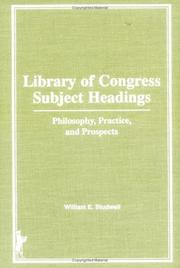
ISBN: 1560240032 Year: 1990 Volume: 2 Publisher: New York (N.Y.): Haworth
Abstract | Keywords | Export | Availability | Bookmark
 Loading...
Loading...Choose an application
- Reference Manager
- EndNote
- RefWorks (Direct export to RefWorks)
Subject indexing --- Catalogage par matieres --- Catalogisering [Onderwerps] --- Catalogisering [Trefwoord] --- Onderwerpscatalogisering --- Onderwerpsontsluiting --- Subject cataloging --- Trefwoordcatalogisering --- Subject headings, Library of Congress --- Analyse documentaire --- Vedettes-matière de la Library of Congress --- Philosophy --- Evaluation --- Philosophie --- 025.43 --- -Subject headings, Library of Congress --- -025.4 --- Trefwoordencatalogi --- LC subject headings --- LCSH (Library of Congress subject headings) --- Library of Congress subject headings --- Subject headings --- Subject analysis --- Cataloging --- Content analysis (Communication) --- Indexing --- Trefwoordensystemen. Thesauri. Descriptorlijsten --- 025.43 Trefwoordensystemen. Thesauri. Descriptorlijsten --- Vedettes-matière de la Library of Congress --- 025.4 --- Subject headings [Library of Congress ] --- Subject headings, Library of Congress - Evaluation. --- Subject cataloging - Philosophy. --- Subject cataloging.
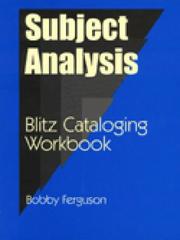
ISBN: 156308645X Year: 1998 Publisher: Englewood, Colo Libraries Unlimited
Abstract | Keywords | Export | Availability | Bookmark
 Loading...
Loading...Choose an application
- Reference Manager
- EndNote
- RefWorks (Direct export to RefWorks)
Subject cataloging --- Subject headings, Library of Congress --- Classification, Dewey decimal --- Classification, Library of Congress --- Analyse documentaire --- Vedettes-matière de la Library of Congress --- Classification décimale de Dewey --- Classification de la Bibliothèque du Congrès --- Problems, exercises, etc --- Problèmes et exercices --- Sears, Minnie Earl, --- 025.4.01 --- -Subject headings, Library of Congress --- LC subject headings --- LCSH (Library of Congress subject headings) --- Library of Congress subject headings --- Subject headings --- Subject analysis --- Cataloging --- Content analysis (Communication) --- Indexing --- Library of Congress classification --- Classification --- Dewey decimal classification --- Classification, Decimal --- Onderwerpsontsluiting: grondslagen en methoden. Notatie. Facettentheorie --- Books --- Sears, Minnie Earl --- 025.4.01 Onderwerpsontsluiting: grondslagen en methoden. Notatie. Facettentheorie --- Vedettes-matière de la Library of Congress --- Classification décimale de Dewey --- Classification de la Bibliothèque du Congrès --- Problèmes et exercices --- Problems, exercises, etc.
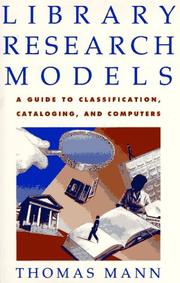
ISBN: 0195081900 019509395X Year: 1993 Publisher: New York Oxford University Press
Abstract | Keywords | Export | Availability | Bookmark
 Loading...
Loading...Choose an application
- Reference Manager
- EndNote
- RefWorks (Direct export to RefWorks)
Library research --- Bibliografische opzoekingen --- Catalogage par matieres --- Catalogisering [Onderwerps] --- Catalogisering [Trefwoord] --- Classificatie van de Library of Congress --- Classification [Library of Congress ] --- Classification de la Library of Congress --- Data retrieval --- Data storage --- Demande d'information --- Dépistage de l'information --- Information -- Dépistage --- Information -- Recherche --- Information retrieval --- Information storage and retrieval --- Informations -- Recherche --- Least effort principle (Psychology) --- Onderwerpscatalogisering --- Onderwerpsontsluiting --- Principe du moindre effort (Psychologie) --- Principe van de minste inspanning (Psychologie) --- Recherche bibliographique --- Recherche d'information --- Recherche de l'information --- Repérage de l'information --- Retrieval of information --- Searching [Bibliographical ] --- Subject cataloging --- Subject headings [Library of Congress ] --- Trefwoordcatalogisering --- Trefwoorden [Library of Congress ] --- Vedettes-matiere de la Library of Congress --- Classification, Library of Congress --- Research --- Searching, Bibliographical --- Subject headings, Library of Congress --- Classification de la Bibliothèque du Congrès --- Recherche --- Recherche documentaire --- Analyse documentaire --- Vedettes-matière de la Library of Congress --- Methodology --- Méthodologie --- -Subject headings, Library of Congress --- -#A9404A --- LC subject headings --- LCSH (Library of Congress subject headings) --- Library of Congress subject headings --- Subject headings --- Subject analysis --- Cataloging --- Content analysis (Communication) --- Indexing --- Psychology --- Library of Congress classification --- Classification --- Library skills --- Library use skills --- Bibliography --- Books --- Classification de la Bibliothèque du Congrès --- Vedettes-matière de la Library of Congress --- Méthodologie --- #A9404A --- United States --- Methodology.
| Listing 1 - 10 of 13 | << page >> |
Sort by
|

 Search
Search Feedback
Feedback About UniCat
About UniCat  Help
Help News
News